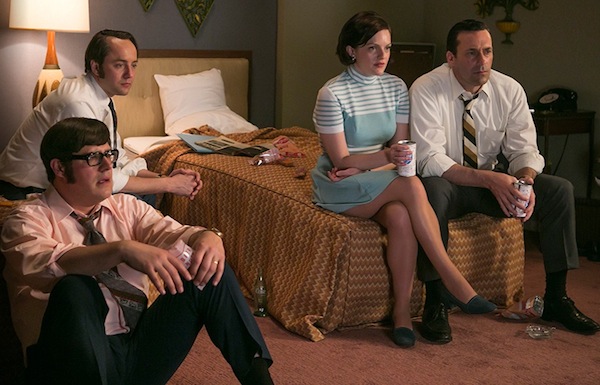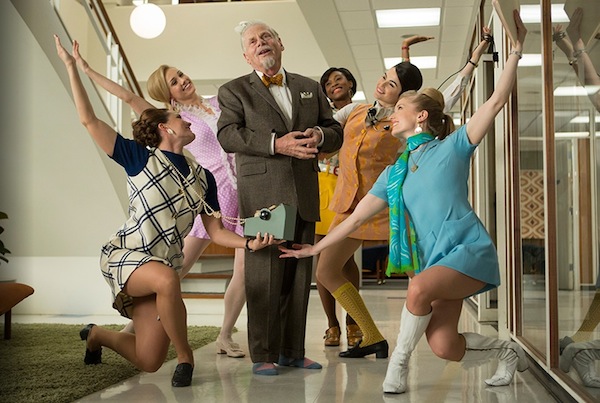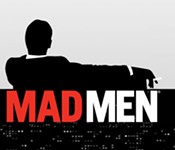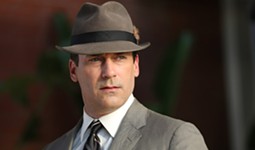The History Book on the Shelf Is Always Repeating Itself
'Mad Men' hits reset with midseason finale "Waterloo"
By Rod Machen, 9:25AM, Tue. May 27, 2014
The first half of the last season of Mad Men ended with a bang. Or more appropriately, a blastoff.

The Apollo 11 space mission that first put a man on the moon took center stage in this episode, and creator Matthew Weiner, who wrote and directed "Waterloo," milked it for all it was worth. While most of the story concerned the future of Don Draper – as well as the future of the firm – there was no escaping the “one giant leap for mankind.”
The human race reached new heights with this event, and the entire nation was fixated on it. Meanwhile, Sterling Cooper & Partners wrestled with itself in an attempt to define its future and who would be a part of it.
On one side is Harry Hamlin’s Jim Cutler (oh Lord, how I've missed him since L.A. Law), who has a vision for the company that involves computers, television, and modern everything. The business-minded Cutler is aligned with the now-depressed (and possibly suicidal) Ted Chaough and has enlisted Joan Holloway as well.
On the other side is the old guard. Old not because of their age, though that certainly applies to Bert Cooper and Roger Sterling, but because this group wishes it was still 1955, when martinis were lunch and a lady’s fanny was there to be pinched.
These two factions don’t represent good and evil or right and wrong. It’s about power, as it always has been, and on this day Roger and company win out. Jim wants Don gone and rightly calls him out as “a bully and a drunk, a football player in a suit." Roger, however, likes Don, likes what Don stands for, and makes a deal with the dreaded McCann Erickson to buy out the firm.
The "Mad Men" of a few years ago would have balked at partnering with the enemy, but times have changed. Hell, there’s a man on the moon and a computer whirring away in the middle of the office. Deals with the devil are part and parcel of shaping a future one wants to have control of. It also means a lot of money for everyone, which gave this show a bit of “We found the buried treasure!” vibe.
Along the way, tragedy struck. Bert Cooper, he of the shoeless office and Rothko above the couch, passed away. In one sense, it signaled a shifting of the tides toward Jim and Joan, who now have the votes to do whatever they want with Don as well as the firm. But Bert’s death ended up pushing Roger into action – something that usually takes an orgy or three – which resulted in the sale of the firm and a reprieve for Don.
On the other hand, the series reached a high point in the evolution of its most evolved and evolving character, and possibly its most important one. Peggy Olson finally snatched the pebble from Don’s hand, though no one was rooting harder for her than Don himself. This episode featured one of those magical pitch meetings, the raw meat that hungry viewers yearn for every season.

Before the board of Burger Chef, the number two fast food franchise at the time, Peggy dazzled. Just the night before, Neil Armstrong had stepped out of the lunar module and into history. Peggy seized the moment, not for what it said about the advancement of our species, but for the connection that was felt by everyone watching that famous small step.
She lays out a vision of America in the summer of 1969: mired in war abroad, tension at home, modernity advancing at a staggering rate. As only a great ad (wo)man can do, she uses this to sell hamburgers, but burgers in the guise a family meal better shared under the fluorescent lights of Burger Chef than in the chaotic home with its infighting and TV trays. It's a sublime moment for Peggy, who has spent all season doubting herself both as a professional and as a woman. On this day, shining in front of her mentor and winning the business, she had it all.
Weiner wasn’t content to leave us with that kind of uplifting victory; he had to end with that aforementioned bang. After the sale of the firm is agreed to and a memorial to Bertram Cooper begins, Don gets quite a shock. Bert appears before him, clad in socks and suit, and proceeds to croon "The Best Things in Life Are Free" while surrounded by dancing secretaries. Don just stares, while actor Robert Morse, who first made a name for himself on Broadway in How to Succeed in Business Without Really Trying, delivers what would be a fabulous bit of music theatre if it weren't taking place right next to the conference room.

By the time the apparition disappears, Don’s eyes are wet, and we’re left to watch the weight of those words sink in for a man who’s always chasing the next best thing. It was surely a little heavy-handed, not to mention surreal, but it gave a melancholy ending to what was on balance a feel-good affair.
There are seven episodes left in the world of Mad Men, and we'll have to wait until 2015 to see what most likely be the last few months of 1969. Audiences will once again have the reset button pushed for them, as a new iteration of the firm comes to fruition and the hurt and hurtful characters of this show make their final appearances on our television sets. We can’t wait to make that connection.
A note to readers: Bold and uncensored, The Austin Chronicle has been Austin’s independent news source for over 40 years, expressing the community’s political and environmental concerns and supporting its active cultural scene. Now more than ever, we need your support to continue supplying Austin with independent, free press. If real news is important to you, please consider making a donation of $5, $10 or whatever you can afford, to help keep our journalism on stands.
Marjorie Baumgarten, Jan. 12, 2017
Rod Machen, April 12, 2014
March 9, 2025
Mad Men, Waterloo, Matthew Weiner, Elisabeth Moss, Jon Hamm, Robert Morse










